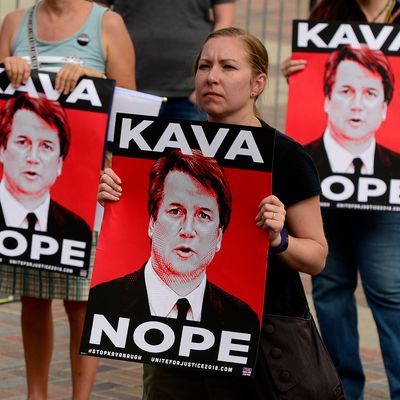
“This is a moment we’re going to look back on,” warns Janai Nelson of the NAACP Legal Defense and Educational Fund. “This confirmation, if it comes to pass, will be as detrimental, if not more, as Trump’s inauguration.”
She’s talking about the potential ascendancy to the Supreme Court of the studiously bland and amiable Brett Kavanaugh, whose nomination hearings kick off in the Senate today. Progressive advocates — and conservatives, when they talk among themselves — believe that with Kavanaugh on the nation’s highest court, the right would consummate its half-century-long dream of dismantling what’s left of abortion access, curtailing remedies to racial discrimination, undermining LGBT rights, minimizing regulations on guns and the environment, and unleashing more big money into politics. But then why, outside of the Twitter feeds of professional progressives who raise hell for a living, doesn’t it feel like a national emergency?
A clue lies in what consumed the political media’s oxygen over the weekend: John McCain’s funeral. There was palpable sense of relief in some journalistic quarters to finally get to say nice things about a Republican again, to be able to return — if only for a few days — to the bipartisan veneer of an earlier era. Writing in the New Yorker, Susan Glasser described a funeral attended by Dick Cheney as “the biggest resistance meeting yet,” and quoted retiring Arizona senator Jeff Flake reassuring those agonized by all things Trump that “the fever will break eventually.” But however pointedly McCain’s funeral speakers on the right, left, and center implicitly took Trump to task for lack of decorum and assorted other misdeeds, and however much the president has flouted the rule of law, his nominee is one of the Republicans’ own. And so, at this so-called gathering of the resistance, no one seemed to expect Flake — a member of the Senate Judiciary Committee, after all — to really resist, to demand, say, that the Trump administration produce some of those 100,000 Bush-era Kavanaugh documents that they abruptly withheld.
Meanwhile, a little over a week ago, the actual resistance took to the streets nationwide to register their opposition to Kavanaugh. While the organizers touted it as “the largest single-day protest of a Supreme Court nominee,” it didn’t exactly make headlines. “A lot of the national press sat it out entirely,” says MoveOn’s Ben Wikler. And the truth is, the numbers – 1,200 people showed up in New York City, the biggest turn-out cited – didn’t approach those of the women’s marches or the immigration protests. It doesn’t help that pro-Kavanaugh groups have vastly outspent the opposition, with the conservative Judicial Crisis Network pumping twice as much money into television ads than all of the progressive groups combined. Nor that the nomination is bracketed by the Fourth of July and Labor Day, moving at warp speed relative to Kavanaugh’s paper trail. Or that plenty of activists are exhausted and preoccupied with the midterms, not to mention distracted by the cascade of criminal proceedings around the president. Then there’s Trump’s unusual discipline on the topic of the Court; he’s entered into the fray over Kavanaugh very little since naming him, keeping the media attention trained on his antics elsewhere.
Those fighting Kavanaugh say that their biggest challenge, however, is the perception that his nomination is a done deal. And for that, they place the blame on Senate Democrats — above all, Minority Leader Chuck Schumer. “It’s been frustrating how the Democrats in Washington are not modeling to the public at large how urgent this situation is,” says Brian Fallon, whose advocacy group, Demand Justice, was formed earlier this year as a counterweight to decades of conservative organizing around the court. “They need to spark the conflagration.”
Granted, Fallon and other progressive activists concede, Democrats are in the minority, but that never stopped Republicans from doing whatever they could to derail the moving train. Yet the leadership is allowing red-state Democratic senators who are up for re-election to equivocate on Kavanaugh, which in turn reduces the pressure on purportedly pro-choice Republicans Susan Collins of Maine and Lisa Murkowski of Alaska. “Everyone needs therapy — everyone is mourning the collapse of the old world,” says one progressive activist who’s pressing to persuade elected Democrats to treat the judiciary as political terrain, to let go of old norms dictating that the president is entitled to put his nominees on the Supreme Court. (Ask Merrick Garland about that one.) “There’s a hunger to see the lawlessness occurring matched by outrage and a disruption of business-as-usual, and many people don’t feel like we’re seeing that.”
Last week, Fallon publicly roasted Schumer, his former boss, for making a deal with majority leader Mitch McConnell to fast-track 15 lower court nominees, in exchange for a vote on some Democratic favored judges and a few extra days of home-state campaigning for incumbents. “At the same time that they’re being railroaded on the Kavanaugh nomination, they’re being accommodationists to the rest of Trump’s makeover of the federal judiciary,” Fallon complained in an interview. (According to HuffPost, in the less than two years since Trump took office, he’s filled one in seven U.S. circuit court judgeships, positioning Trump-approved jurists to make law on some of the most contested issues of our times for a generation, since so few cases actually make it to the Supreme Court.)
So why isn’t Schumer taking it to Kavanaugh? There’s a belief among Democrats that the party’s voters don’t reward fights on judges — only Republicans do that. So the worry is that a full-throated assault on Kavanaugh could backfire, bringing Trump voters to the polls in red states and endangering Democrats’ chances of taking back the Senate in the midterms. Never mind that Kavanaugh is highly unpopular, with much less support among Americans than his immediate predecessor Neil Gorsuch, or that Roe v. Wade has never had more support. (Perhaps these polls explain why the Senate Democrats who activists do credit for aggressively contesting Kavanaugh are all potential presidential candidates in 2020 — among them, Kirsten Gillibrand, Cory Booker, and Kamala Harris.)
Reproductive justice advocates are especially incensed about elected officials’ refusal to make more of the fact that legal abortion is on the chopping block. “The women who make up the resistance are focused on the end of Roe and the reversal of decades of progress by a misogynistic administration and GOP,” says NARAL president Ilyse Hogue. “That’s also what the majority of Americans are concerned about when it comes to Kavanaugh.” But Democrats seem more comfortable talking about missing documents than about Roe. “The process arguments are important, but they’re largely inside baseball.”
If Kavanaugh’s nomination isn’t blocked, it may mark the end of the lingering liberal romance with the Supreme Court. Fallon says his group has conducted phone surveys that show that despite cases like Citizens United and Shelby County v. Holder, which gutted the Voting Rights Act, engaged Democrats still have a generally positive view of the Roberts court, thanks to its narrowly decided opinions upholding the Affordable Care Act and affirming same-sex marriage. And the less-remembered Whole Woman’s Health decision — which, a few months before the 2016 election, put the brakes on Texas laws designed to shut down abortion clinics under the pretense of patient safety — seemed to undermine the claim that Roe was on the line.
But a court with Kavanaugh, one that doesn’t have to tiptoe around retired justice Anthony Kennedy to get to a majority, could change that rosy perception. “There’s more fight in the Kavanaugh battle than there was in the Gorsuch battle, and there was more fight in the Gorsuch battle than there was in the Merrick Garland battle,” says Wikler. “But most Democrats still don’t feel as though the Supreme Court is stomping on their necks.” A Supreme Court that makes it harder to vote, get an abortion, sue a major corporation, or seek redress to discrimination — or that gives Trump a major assist if the question of whether sitting presidents can be investigated or indicted reaches the Supreme Court — could ignite a liberal backlash in time for the 2020 elections. But by then, how much damage will be irreversible?
To stiffen their spines, Democrats might consider what a Republican senator declared in October 2016, back in the Hillary inevitability days. “I promise you that we will be united against any Supreme Court nominee that Hillary Clinton, if she were president, would put up,” he declared. As straight talk and bipartisanship and honor itself are apparently laid to rest alongside his body – and as Trump’s takeover of the Supreme Court is assumed to be inevitable – remember that the man who said that was John McCain.






























